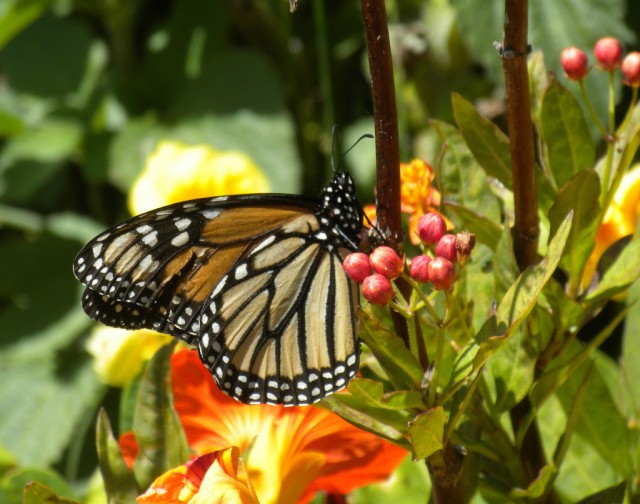The Monarchs are in trouble

I’ve been blogging about Monarch butterflies practically from the moment this blog began. I’ve been growing milkweed, the only host plant for monarch caterpillars, in our yard for over a decade—first in Crozet, Virginia, and then here in San Diego after our move seven years ago. When you leave a comment on this blog, if you don’t happen to have a WordPress avatar set up, the default avatar is a picture of milkweed from my garden. I made a very dopey video, once, showing some of our butterfly plants, and was lucky enough to catch a Monarch in the act of laying an egg on the underside of a leaf. We’ve been a family wrapped up in bees and butterflies for a very long time.
We had a fair number of caterpillars last year, enough to eat our five plants to the ground. But this year may be different.
This year, the giant Monarch migration that takes place in the mountains of Mexico has been, well, not exactly giant.
…for the first time in memory, the monarch butterflies didn’t come, at least not on the Day of the Dead. They began to straggle in a week later than usual, in record-low numbers. Last year’s low of 60 million now seems great compared with the fewer than three million that have shown up so far this year. Some experts fear that the spectacular migration could be near collapse.
The reasons aren’t a mystery:
A big part of it is the way the United States farms. As the price of corn has soared in recent years, driven by federal subsidies for biofuels, farmers have expanded their fields. That has meant plowing every scrap of earth that can grow a corn plant, including millions of acres of land once reserved in a federal program for conservation purposes.
Another major cause is farming with Roundup, a herbicide that kills virtually all plants except crops that are genetically modified to survive it.
As a result, millions of acres of native plants, especially milkweed, an important source of nectar for many species, and vital for monarch butterfly larvae, have been wiped out. One study showed that Iowa has lost almost 60 percent of its milkweed, and another found 90 percent was gone. “The agricultural landscape has been sterilized,” said Dr. Brower.
This article touches, too, on the dire plight of the honeybee, about which I’ve had much to say on this blog over the years.
I don’t often feel helpless. But with this, I do. What can I do beyond the small acts I’ve been doing? Planting milkweed, singing the joys of bee-and-butterfly gardening, avoiding pesticides and herbicides even though that means I have a weedy garden. Keep on singing, I guess?

Ellie says:
Oh Lissa, it is so awful. Dire, really, and what can we do? You’re right: keep on singing, one person, one milkweed plant, one small garden plot or tiny yard at a time ….
On November 25, 2013 at 4:38 pm
Louise says:
This is so heartbreaking. There is a bee-and-butterfly garden here on the campus where we live now, and I appreciate it even more than I did before after reading this. Save the milkweed!
On November 25, 2013 at 5:08 pm
Selena says:
I feel helpless too. It’s distracting me from my regular daily concerns. And it’s not a first world problem. So scary 🙁
On November 25, 2013 at 5:51 pm
sarah says:
I despair over this. It’s not just an American issue, either. And that’s all I shall say, for fear of dissolving into a tear-stained rant.
Keep singing, and most of all teach your children to sing too.
On November 25, 2013 at 7:08 pm
Dori says:
The plight of the bees and butterflies is so dire. I continue to sing, too!
On November 26, 2013 at 8:27 am
Tracy says:
They will lay their eggs on milkweed vine also, which grows all over our lawn. All summer, my husband sifts through all the vine sprouting up through the grass, rescues any eggs and caterpillars he finds, and then mows the lawn. We usually end up raising them inside to protect them from tachinid flies, but we’ve found fewer each year.
On November 26, 2013 at 9:40 am
monica says:
have you read barbara kingsolvers latest novel? it is wonderful (as all hers are) and the plot is centered around monarch migration
On November 26, 2013 at 9:55 am
Lisa says:
I was going to say Flight Behavior but Monica beat me to it. Worth a read–she’s such a compelling author.
On November 27, 2013 at 7:38 am
maria says:
Sing! Yes, continue to sing! Each voice joins together to form the cry of a massive choir that must be heard and listened to. Simply must. Just must be. The alternative is too horrid to comprehend. So yes, please keep singing.
On December 1, 2013 at 2:17 pm